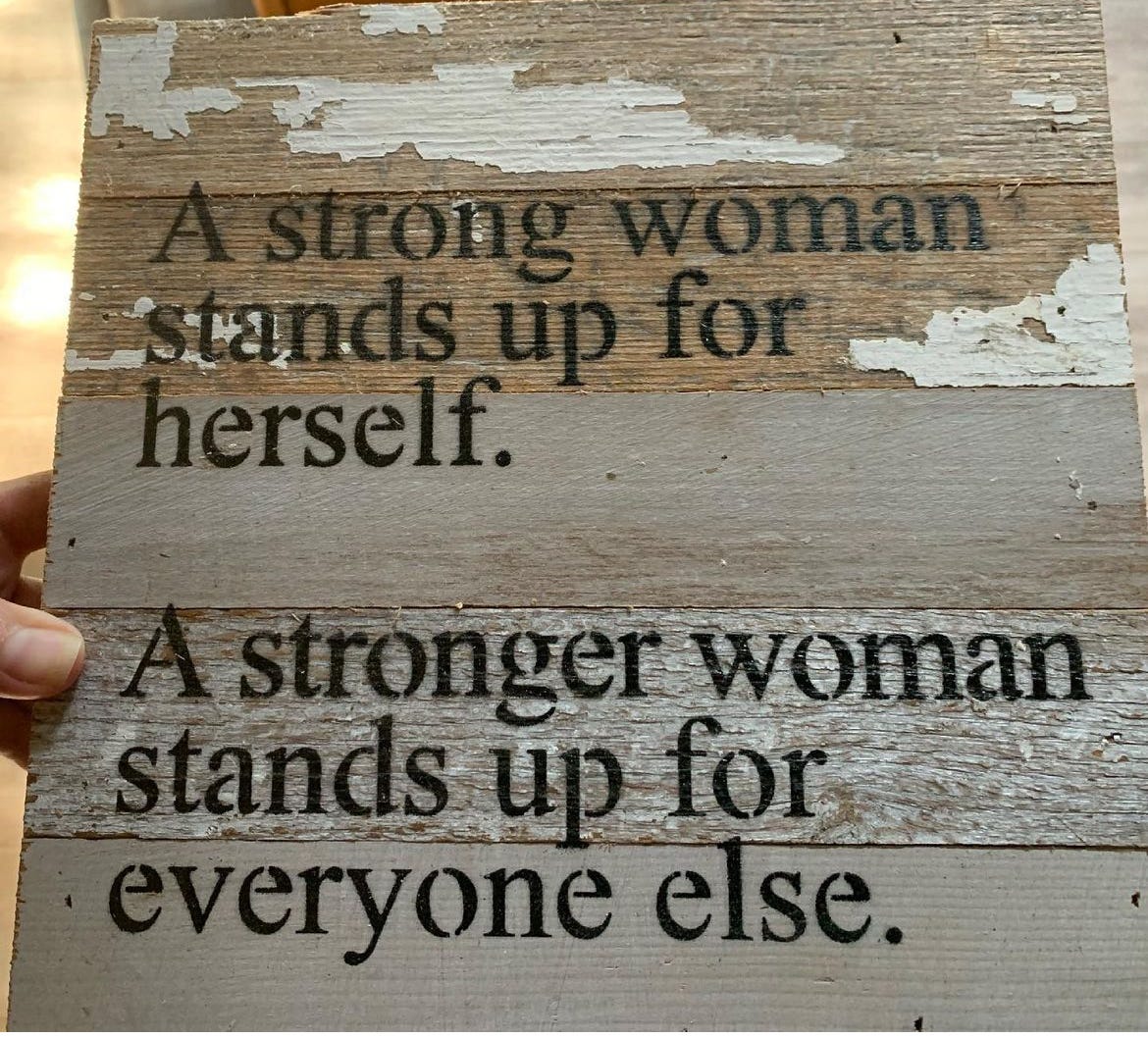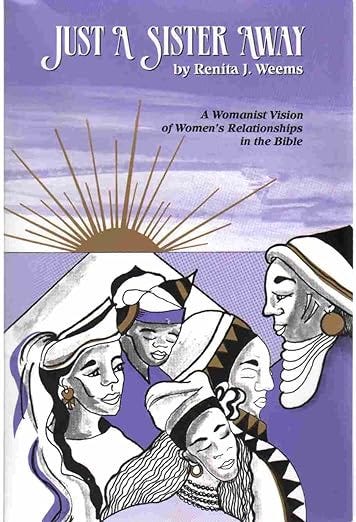How a Woman Feels About Being a Woman
And how she reveals it.
One of the best ways to get an idea of how a woman feels about being a woman is to take a look at how she treats other women.
So Renita Weems powerfully opens her book, Just a Sister Away: A Womanist Vision of Women’s Relationships in the Bible. Isn’t that powerful?
I’ve only finished chapter one, which is a look at the relationship between Sarah and Hagar. I want to share some of it with you. If you want a refresher, read Gen. 16:1-16 and 21:1-21. The very short (and inept) recap is that Sarah is old and barren. Although her husband Abraham is wealthy and socially prominent, her inability to have children made her a woman to be scorned. Hagar is an Egyptian slavewoman to her mistress, Sarah (I’m sticking with Sarah and Abraham as not to add name-change confusion). So we have Sarah, with a high social standing in an ancient patriarchal culture as Abraham’s wife, but no respect due to her bareness. Beautiful but barren. Material abundance without comfort. And you have the young, fertile, poor slavewoman, Hagar.
When God promises Abraham a child, saying his children will be as numerous as the stars in the sky, things didn’t seem to be panning out so well. It’s a little late for a promise like this, given he and Sarah have seriously aged out of the childbearing years. And it wasn’t one of those, “And then, boom, she was pregnant” deals. So, Sarah begins to take matters into her own hands, telling Abram that maybe this heir is supposed to be provided through her handmaiden, Hagar. Hagar has no voice in this. As it goes. But perhaps, Sarah thinks, she will finally be esteemed through her.
Well, if you know the story, Abraham—who seems entirely too passive—complies. Hagar has no choice. And she bears him a son. Only, now there is beef between the women. Hagar, with Abraham’s son, loses her sense of honor for Sarai. She might feel a small bit of power for once. And whose son is this, really? Sarah’s or Hagar’s? There’s contempt between the two. Sarah blames Abraham and treats Hagar badly, showing the real power differential. So badly, that Hagar escapes with her son. And the angel of the Lord visits her. And she returns.
Weems spends good space talking about the ethnicity factor (and how later it switches to the Hebrews enslaved by the Egyptians) and the power and class differentials, helping us think about all the dynamics between women now. I recommend it to you, there’s a lot to wrestle through.
Then, of course, Sarah has her own son, Isaac. Now the contempt grows as the boys do, Sarah wants Isaac to have all the inheritance, and she wants Hagar and Ishmael the heck out of there. And so she tells Abraham to evict Hagar and Ishmael. Although he complies reluctantly, he sends them off to only God knows where, with a mere skin of water and some morsels of bread. There are so many powerful points in Weem’s chapter that all relate to the title of the book, I want to share a few. First, with all the contempt and bad treatment, Sarah seems to forget the position she was in not that long ago. Weems:
“As Abram’s wife, Sarai proved to be unfaithful and too impatient to trust God’s promise to her husband. She lost sight of who she was in relation to the sovereign word of God, and in so doing, she lost sight of reality itself. Sarai forgot that in a patriarchal society she and her female slave Hagar had more in common as women that than which divided them as Hebrew mistress and Egyptian slavewoman. In fact, the only thing that separated the two women were a couple of cattle and some sheepskins (which in today’s language translates to a paycheck and a diploma).”
The behavior of both of these women towards one another reveals how they think about themselves, and about women. Sarah wants the esteem of bearing a son for Abraham. When Hagar is able to provide this, she loses respect for Sarah. When she is treated badly and escapes, she still could only understand herself as a slave, property (Gen. 16:8). When Hagar is banished with nowhere to go and meager rations, Weems reminds us that the word of one woman would have made all the difference. At the least, she could have reminded her husband that “his responsibility to the Egyptian woman and their child went beyond water and a few crumbs of bread.”
“We must remember this story for its piercing portrayal of one woman’s exploitation of another woman.”
The ways women treat other women! Sarah cares only for the security and respect of herself and her son. She is unwilling to show Hagar the same mercy that God showed her, even when “her back was up against the wall…Had Sarah forgotten so quickly what if felt like to be rejected and scorned?”
“The story of Hagar and Sarah touches us in the many places we hide, places which are not often held up for public view.”
Right?!
“At some time in all our lives, whether we are black or white, we are all Hagar’s daughters. When our backs are against the wall; when we feel abandoned, abused, betrayed, and banished; when we find ourselves in need of another woman’s help (a friend, neighbor, colleague, relative, stranger, another man’s wife); we, like Hagar, are in need of a woman who will ‘sister’ us, not exploit us.
“In those times we are just a sister away from our own healing. We need a woman, a sister, who will see in our destitution a jagged image of what one day could be her own story. We need a sister who will respond with mercy. We need a sister whose genuine mercy—not pity which is episodic, random, and moody—is steadfast, consistent, and free.”
Weems preaches it, here are some gems:
“It will require a willingness to respect the genuine differences in one another and to see them as the strength of our coalition, not the bane of our existence.
“As black and white women in America, as Israeli and Lebanese women, as white South African and black South African women, as Asian and European women, as the wives of terrorists and the wives of victims of terrorists, working for righteousness in splendid isolation from one another is a luxury we cannot afford.
“Injustice in our lands relies upon the perpetual alienation of women from one another and upon relentless hostility between women. Indeed, our estrangement from one another continues to compromise the integrity of our witness as God-fearing women.”
Because:
“If we don’t, who will?”
I just wanted to clap after that chapter. And yet I fall so short of keeping my eyes on the very beauty I discover. So much of my work has focused on the meaningfulness of woman. Our sexuality points to the peace of the final sabbath, of people and place: Zion, God’s beloved. God’s dwelling place with his people. When will we know this in our bones? When will we understand our own power to love? And when will we know the privilege of sisterhood? Women, how do you feel about being a woman?
God revealed this to Hagar. She is the first person to name God in Scripture, the only person in the Hebrew Bible who gives God a name, El Roi, “The God who sees me” (Gen. 16:3).
What if we can know this beholding? What if we can look at ourselves and one another like this: seen by God? What if that is what it feels like to be a woman? What if we are just a sister away from healing and love? What if you are that sister today?





oh my goodness!! I too will order right away. I just taught Sarah and Hagar to my Bible study in a women’s prison. There is a beautiful sculpture of Hagar, which I printed a copy of for them to keep to remind themselves that they are never separated from their God.
the I was very lucky to be raised in a church where I saw women love, encourage each other, support their choices, come along in hardships not nitpick to death by each other. Sadly the evangelical church seems to be a breeding ground for female insecurity, power brokering, distrust, and shame.
I want to get that book and read it...it was already in my Amazon wish list.
You might like to read the autobiographical Princess series about life in Saudi Arabia, where in the third book, after learning to stick up for themselves and each other, the pampered royal women decide to do something to protect the exploited and abused women around them.
The Princess Trilogy: Boxed Set (Princess; Princess Sultana's Daughters; Princess Sultana's Circle) https://a.co/d/fshOgzY